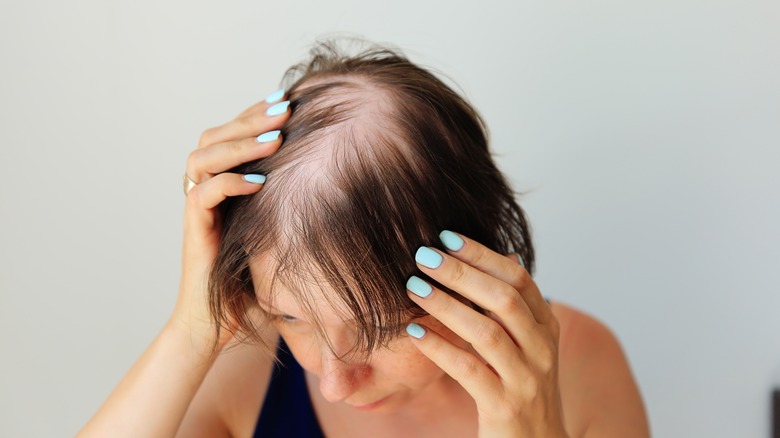Do Vitamins For Hair Loss Actually Do Anything?
We may receive a commission on purchases made from links.
In the U.S., vitamins and other supplements are completely unregulated by the Food and Drug Administration. This points to a vulnerability in our sales and profit-oriented culture; we're bombarded with glamorous and persistent marketing messages, yet not entirely sure which ones are reliable.
The supplement industry often makes specific health claims to promote their products, including hair loss vitamins. Truth In Advertising cites a class-action suit against Nutrafol, a company that maintains its product prevents hair loss. Usually, finding the truth lies somewhere between digging into some online research and setting up a consultation with a doctor. And part of your research should include getting a handle on what's normal in hair loss and what's not.
Anyone balding or losing their hair may feel shame and will go to great lengths to reverse that. The research backs this up: industry research analyst IBISWorld estimates that as of 2022, hair loss treatment manufacturing is a $3.9bn industry in the U.S. alone. But when it comes to vitamins and supplements that claim to fix hair loss, there just isn't enough research to support them.
So, what does the science say?
Anya Rosen, M.S., R.D. (registered dietician) shared with Shape that hair loss and balding have multiple causes, including imbalanced hormones, stress, an underactive thyroid, and nutrient deficiencies, including food restriction. Over-exuberant hair styling, inflammation, scalp issues, and certain medications can even cause it. And sometimes hair loss is simply hereditary. You should also know about traction alopecia and its risk to your hair health.
The causes of hair loss are so varied it makes treatment more difficult. However, nutrients and vitamins missing from a lack of proper nutrition, not getting enough calories because of an eating disorder, and some vegan diets are known contributors to hair loss or brittleness. Healthline reports that deficiencies in "B vitamins, iron, and vitamins C and D have been linked to hair loss, poor hair growth, and weak hair."
The industry's response is to promote hair loss vitamins, but, according to Healthline, "there's little clinical data to support their ability to treat hair conditions. While certain nutrients have been linked to better hair health, most studies have shown that hair supplements are only effective in people whose hair issues are caused by an existing nutrient deficiency." The types of nutrient deficiencies associated with hair loss aren't usually the ones used in hair vitamins. In a study authored by Houston-based dermatologists Emily Guo and Rajani Katta – "Diet and hair loss: effects of nutrient deficiency and supplement use" — they cite the lack of research regarding the subject and explain that "in fact, some supplements carry the risk of worsening hair loss or the risk of toxicity."
What to do about hair loss
If you're concerned because of a sudden increase in hair loss or chunks are falling out, your first stop is the dermatologist's office, stat. As with any medical concern, please don't self-diagnose — you want your doctor to check for hormonal imbalances, stress, and other issues. To open up a conversation with your practitioner, bring in anything that you've read you want to discuss.
You also may not be getting the right nutrients. But the most grounded, trend-resistant and practical way to get your nutrients is from a rainbow of fresh vegetables and a balanced diet, and not from dependence on vitamin supplements. If you can afford it, buy organic. Focus on anti-inflammatory foods like asparagus and fatty cold water fish like salmon.
Some of the common deficiencies associated with hair loss include biotin, iron, zinc, and vitamin D. Foods rich in biotin include eggs, mushrooms, and salmon. Zinc is in seafood, meat, and dairy, and iron in its most usable form comes from poultry and red meat. Vitamin D comes from sun exposure as well as eggs, salmon, and other fatty fish. Functional medicine physician Dr. Mark Hyman's "The Pegan Diet" is a sound dietary recommendation. Get the right amount of sleep, and engage in some kind of enjoyable movement every day.


